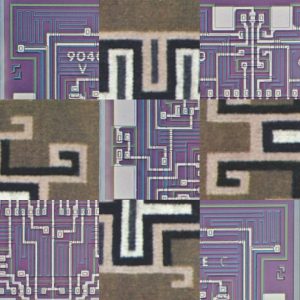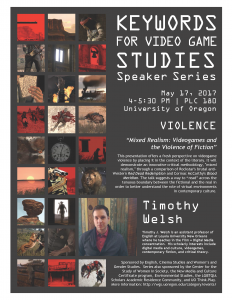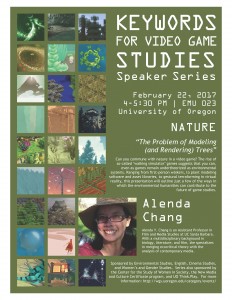Eryn
The Hidden Circuits of Indigenous Computer Labor: A Photographic History of The Navajo Fairchild Ladies of Shiprock, New Mexico
Friday, June 9, 2017
4:00 – 5:30 PM
PLC 180
From 1965-1976 the Fairchild Semi-conductor Corporation employed almost a thousand Navajo women and men in a state of the art plant on a Navajo reservation in Shiprock, New Mexico. This paper uses previously unpublished photographic images from the archives of Henry Mahler, an industrial photographer who worked on site in Shiprock, to illustrate how women of color were incorporated into early discourses about gender in the digital industries.
Lisa Nakamura is the Gwendolyn Calvert Baker Collegiate Professor of American Cultures at the University of Michigan, Ann Arbor, and coordinator of its Digital Studies Program. She is the author of four books on racism, sexism, and the Internet. Her book Workers Without Bodies: Racism, Sexism, and Digital Labor in Social Media and Gaming is under contract with University of Minnesota Press.
Event made possible by English, Women’s and Gender Studies, Native American Studies, Ethnic Studies, Media Studies in the School of Journalism and Communication, the Center for the Study of Women in Society, the New Media and Culture Certificate program, the LGBTQIA Scholars ARC, and the Oregon Humanities Center. Contact Dr. Edmond Y. Chang (echang@uoregon.edu) or Dr. Tara Fickle (tfickle@uoregon.edu) for more information.
WGS Grad Certificate student Lacey Guest awarded CSWS Graduate Research Grant
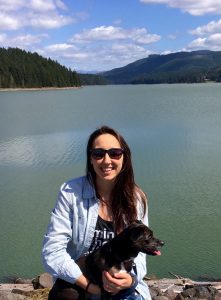 Congratulations to WGS graduate certificate student Lacey Guest on receiving the CSWS Graduate Research Grant for 2017-2018! Her research project is entitled: “Magic and Power: Educating African-American College Students in the Science of Marriage, 1920s-1960s.”’
Congratulations to WGS graduate certificate student Lacey Guest on receiving the CSWS Graduate Research Grant for 2017-2018! Her research project is entitled: “Magic and Power: Educating African-American College Students in the Science of Marriage, 1920s-1960s.”’
From the CSWS website:
The Center for the Study of Women in Society at the University of Oregon recently awarded more than $60,000 in student and faculty research grants to support research on women and gender during the 2017-18 Academic Year. The research being funded includes projects focused in Portland, Oregon, and all over the globe.
In all, ten UO graduate students will receive awards ranging from $1,000 to more than $12,000. Four faculty scholars will receive awards ranging from $3,000 to $6,000 each.
Evelyn Nakano Glenn to deliver inaugural CSWS Acker-Morgen Memorial Lecture
Evelyn Nakano Glenn will deliver the inaugural CSWS Acker-Morgen Memorial Lecture. This new annual lecture series commemorates the legacies of CSWS directors Joan Acker and Sandra Morgen.
Settler Colonial Legacies: Racialized and Gendered U.S. Citizenship
Date & Time: April 24, 2017, 3:30 – 5:00 pm
Location: Knight Library Browsing Room, 1501 Kincaid St., UO campus
 Evelyn Nakano Glenn, professor emerita of the Graduate School and founding director, Center for Race and Gender, at the University of California, Berkeley, will deliver the inaugural CSWS Acker-Morgen Memorial Lecture on April 24, 2017, at 3:30 p.m.
Evelyn Nakano Glenn, professor emerita of the Graduate School and founding director, Center for Race and Gender, at the University of California, Berkeley, will deliver the inaugural CSWS Acker-Morgen Memorial Lecture on April 24, 2017, at 3:30 p.m.
Professor Glenn’s books include Forced to Care: Coercion and Caregiving in America and Shades of Difference: Why Skin Color Matters.
Sponsored by the Center for the Study of Women in Society, the UO Graduate School, the UO Division of Equity and Inclusion, the Center for Asian and Pacific Studies, and the Departments of Anthropology, Ethnic Studies, Sociology, and Women’s and Gender Studies.
About CSWS directors Joan Acker and Sandra Morgen
A pathbreaking feminist researcher, Joan Acker was a professor of sociology at the University of Oregon, where she taught for nearly three decades. In 1973, she helped establish what is now the Center for the Study of Women in Society, which she directed until 1986. Her books on gender and class include Doing Comparable Worth: Gender, Class, and Pay Equity; Class Questions: Feminist Answers; and Stretched Thin: Poor Families, Welfare Work, and Welfare Reform (coathored with Sandra Morgen and Jill Weigt). Her many honors and awards included sociology’s top award, the American Sociological Association Career of Distinguished Scholarship Award.
Sandra Morgen
A pioneer in feminist anthropology, Sandra Morgen began teaching at UO in 1991 as an associate professor of sociology, moving to the anthropology department in 2002. She served as director of the Center for the Study of Women in Society from 1991-2006 and later held leadership roles in the graduate school before returning to teach undergraduate- and graduate-level courses. In addition to coauthoring Stretched Thin, Morgen also published Into Our Own Hands: The Women’s Health Movement in the U.S. 1969-1990, winner of the Basker Prize from the Society for Medical Anthropology in 2004. She helped found the Society for North American Anthropology, which honored her in 2003 for outstanding contributions to anthropology in the U.S.
“She Was a Prostitute”: Trace, Race, and Place in Milwaukee’s Sexual Assault Adjudication
Please join us for a special guest lecture by Sameena Mulla of Marquette University! This research talk is free and open to the public.
Date: April 12, 2017
Time: 2:00 – 3:35 pm
Location: Gerlinger Lounge, Gerlinger Hall
“She Was a Prostitute”: Trace, Race, and Place in Milwaukee’s Sexual Assault Adjudication
This presentation demonstrates the complicated ways in which attorneys participating in sexual assault adjudication depend upon both the presence and absence of evidence to build their cases. The presentation argues that absence is as palpable and compelling as presence: who speaks, who does not and what is left unsaid are often central to the practices of the trial. This stands in stark contrast to the public imaginary of material evidence that is legible, determinate, and scientifically infallible. In reality, such evidence exists only in the realm of science fiction. It is the human voice and practices of testimony that centrally figure in adjudication outcomes, even in an era in which forensic evidence is commonly available. Interpreting absences and silences require attorneys to turn jurors towards the normative and familiar, often taking an adversarial posture toward the narrative of the victim-witness.
Based on 10 months of ethnographic research in Milwaukee’s felony court system, this presentation focuses on a common defense narrative: that victims are, in fact, prostitutes, and that defendants were clients. These narratives particularly imperil black women, criminalizing their families and their neighborhoods, and objectifying black women’s sartorial and beauty standards. By reading a single case closely, the project demonstrates the contest over interpreting what emerges (and what is left unsaid) in the course of a trial, while also highlighting the structures of anticipation that inform the strategies of all of the trial participants, be they witnesses, prosecutors or defense attorneys.
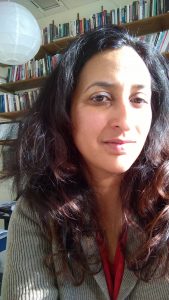 Sameena Mulla is Associate Professor of Anthropology in the Department of Social and Cultural Sciences at Marquette University in Milwaukee, WI. Her broad areas of research and teaching interest are legal and medical anthropology, expert knowledge, institutional ethnography, and gender and sexuality. Her book, The Violence of Care: Rape Victims, Forensic Nurses and Sexual Assault Intervention, details the tensions between criminal justice and nursing practices in sexual assault interventions in a Baltimore, MD emergency room. The Society for Medical Anthropology awarded the book an honorable mention in the Eileen Basker Memorial Prize competition. Currently, Mulla is working on two book projects drawing on field research in the Milwaukee County Court System. The first, Of Lemmings, Wolves and Monsters: Sentencing Sex Offenders in the Courtroom Bestiary, is a genealogical analysis of the use of animal and animal-like figures in courtroom speech, probing the evaluation and presence of racialized imaginaries in the fraught context of sexual assault. The second book project, a collaborative ethnography co-authored with a feminist criminologist, Heather Hlavka, examines and interprets the changing practices of contemporary sexual assault adjudication in relation to new forms of expertise and technology. Mulla is serving her second term as co-chair of the Gender-Based Violence Topical Interest Group of the Society for Applied Anthropology.
Sameena Mulla is Associate Professor of Anthropology in the Department of Social and Cultural Sciences at Marquette University in Milwaukee, WI. Her broad areas of research and teaching interest are legal and medical anthropology, expert knowledge, institutional ethnography, and gender and sexuality. Her book, The Violence of Care: Rape Victims, Forensic Nurses and Sexual Assault Intervention, details the tensions between criminal justice and nursing practices in sexual assault interventions in a Baltimore, MD emergency room. The Society for Medical Anthropology awarded the book an honorable mention in the Eileen Basker Memorial Prize competition. Currently, Mulla is working on two book projects drawing on field research in the Milwaukee County Court System. The first, Of Lemmings, Wolves and Monsters: Sentencing Sex Offenders in the Courtroom Bestiary, is a genealogical analysis of the use of animal and animal-like figures in courtroom speech, probing the evaluation and presence of racialized imaginaries in the fraught context of sexual assault. The second book project, a collaborative ethnography co-authored with a feminist criminologist, Heather Hlavka, examines and interprets the changing practices of contemporary sexual assault adjudication in relation to new forms of expertise and technology. Mulla is serving her second term as co-chair of the Gender-Based Violence Topical Interest Group of the Society for Applied Anthropology.
Keywords for Video Game Studies series: “Mixed Realism: Videogames and the Violence of Fiction”
Please join us for the third in a series of lectures:
Keywords for Video Game Studies
Speaker series
Third lecture: Violence
Date: May 17, 2017
Time: 4:00 – 5:30 pm
Location: PLC (Prince Lucien Campbell) 180, University of Oregon
SPRING 2017: VIOLENCE
“Mixed Realism: Videogames and the Violence of Fiction” with Timothy Welsh
This presentation offers a fresh perspective on videogame violence by placing it in the context of the literary. It will demonstrate an innovative critical methodology, “mixed realism,” through a comparison of Rockstar’s brutal anti-Western Red Dead Redemption and Cormac McCarthy’s Blood Meridian. The talk suggests a way to “read” across the tenuous boundary between the fictional and the real in order to better understand the role of virtual environments in contemporary culture.
Timothy J. Welsh is an assistant professor of English at Loyola University New Orleans where he teaches in the Film + Digital Media concentration. His scholarly interests include digital media and culture, videogames, contemporary fiction, and critical theory.
An image of the flyer is shown below. PDF version here. We hope to see you there!
Faculty in the news: Kemi Balogun on beauty diplomacy in Nigeria
Professor Kemi Balogun’s current book project examines how women’s bodies symbolically represent Nigeria’s aesthetic center and signal the country’s economic potential within the region.
Read the full article here. (OCR-optimized PDF)
Margaret Rhee interviews with Bitch Magazine and Ploughshares
Check out the Bitch Magazine audio interview here, where Professor Rhee discusses fembots on Westworld, and don’t miss “A Way I Could World-Build in Poetry”.
Dr. Juana María Rodríguez delivers second of two 2017 Sally Miller Gearhart Lecture(s) in Lesbian Studies
2017 Sally Miller Gearhart Lecture in Lesbian Studies — Part 2!
Please join us for the second of two very special lectures!
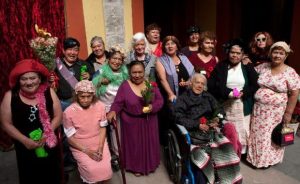 Title: Feeling Photography, Visualizing Testimony, Imagining Alterity
Title: Feeling Photography, Visualizing Testimony, Imagining Alterity
Speaker: Dr. Juana María Rodríguez
Date: January 27, 2017, 11:00 – 12:30 pm
Location: Crater Lake South Room, EMU
 Description: What does “seeing” tell us about the subjective experiences of those whose life stories we are invested in knowing? And how does the visual presence of the speaking subject of auto/biography complicate narratives of their lives? Rodríguez probes the ways forms of representation that combine biographical narrative with visual documentation transform our affective encounters with the social and sexual lives of sex workers in order to question the kinds of interpretive practices we bring to these knowledge projects. In the process, she reflects on how images and text function as complicated triggers for the attachments, identifications, desires, and traumas of our own corporeal embodiments and sexual histories.
Description: What does “seeing” tell us about the subjective experiences of those whose life stories we are invested in knowing? And how does the visual presence of the speaking subject of auto/biography complicate narratives of their lives? Rodríguez probes the ways forms of representation that combine biographical narrative with visual documentation transform our affective encounters with the social and sexual lives of sex workers in order to question the kinds of interpretive practices we bring to these knowledge projects. In the process, she reflects on how images and text function as complicated triggers for the attachments, identifications, desires, and traumas of our own corporeal embodiments and sexual histories.
 Bio: Juana María Rodríguez is Professor of Gender and Women’s Studies and Performance Studies at the University of California, Berkeley. She is the author of two books, Queer Latinidad: Identity Practices, Discursive Spaces (NYU Press 2003) and Sexual Futures, Queer Gestures, and Other Latina Longings (NYU Press 2014) which recently won the Alan Bray Memorial Book Prize at the MLA and was a finalist for the Lambda Literary Foundation for LGBT Studies. Professor Rodríguez has published numerous articles related to her research interests in sexuality studies and queer theory; Latin/o American and Caribbean literature and culture; critical race studies; and technology and media arts and her work has appeared in a range of scholarly journals including GLQ: A Journal of Lesbian and Gay Studies; Women & Performance: A Journal of Feminist Theory; Radical History Review; boundaries 2; a/b: Auto/Biography Studies; Genre: Forms of Discourse, PMLA, and Profession.
Bio: Juana María Rodríguez is Professor of Gender and Women’s Studies and Performance Studies at the University of California, Berkeley. She is the author of two books, Queer Latinidad: Identity Practices, Discursive Spaces (NYU Press 2003) and Sexual Futures, Queer Gestures, and Other Latina Longings (NYU Press 2014) which recently won the Alan Bray Memorial Book Prize at the MLA and was a finalist for the Lambda Literary Foundation for LGBT Studies. Professor Rodríguez has published numerous articles related to her research interests in sexuality studies and queer theory; Latin/o American and Caribbean literature and culture; critical race studies; and technology and media arts and her work has appeared in a range of scholarly journals including GLQ: A Journal of Lesbian and Gay Studies; Women & Performance: A Journal of Feminist Theory; Radical History Review; boundaries 2; a/b: Auto/Biography Studies; Genre: Forms of Discourse, PMLA, and Profession.
Keywords for Video Game Studies: Nature
Please join us for the second in a series of lectures:
Keywords for Video Game Studies
Speaker series
Second lecture: Nature
Date: February 22, 2017
Time: 4:00 – 5:30 pm
Location: EMU 023, Lease Crutcher Lewis Room, University of Oregon
WINTER 2017: NATURE
“The Problem of Modeling (and Rendering) Trees” with Alenda Chang
Can you commune with nature in a video game? The rise of so-called “walking simulator” games suggests that you can, even as games remain undertheorized as environmental systems. Ranging from first-person walkers, to plant modeling software and asset libraries, to gestural terraforming in virtual reality, this presentation will outline just a few of the ways in which the environmental humanities can contribute to the future of game studies.
Alenda Y. Chang is an Assistant Professor in Film and Media Studies at UC Santa Barbara. With a multidisciplinary background in biology, literature, and film, she specializes in merging ecocritical theory with the analysis of contemporary media. Her writing has recently been featured in Ant Spider Bee, Interdisciplinary Studies in Literature and Environment, and Qui Parle, and her current book project develops ecological frameworks for understanding and designing digital games. She also maintains the Growing Games blog as a resource for researchers in game and ecomedia studies and the environmental humanities.
An image of the flyer is also available below. PDF version here. We hope to see you there!
Dr. Alexis Lothian delivers first of two 2017 Sally Miller Gearhart Lecture(s) in Lesbian Studies
![Event poster [see PDF version for recognizable text]](https://wgs.uoregon.edu/files/2016/11/SMG2016_1_Alexis-q4f6l4-300x194.png) 2017* Sally Miller Gearhart Lecture in Lesbian Studies — Part 1!
2017* Sally Miller Gearhart Lecture in Lesbian Studies — Part 1!
* Yes, we know that it is still 2016. 🙂
Please join us for the first of TWO very special lectures!
Title: Queer Longings in Straight Futures: Notes Toward a Prehistory for Lesbian Speculation
Speaker: Dr. Alexis Lothian
Date: December 1, 2016, 4:00 – 5:30 pm
Location: Knight Library Browsing Room
Description: The story of lesbian science fiction is generally assumed to begin in the 1970s, as feminist political and literary movements converged with gay liberation. For her forthcoming book Old Futures: The Queer Cultural Politics of Speculative Fiction, Dr. Lothian researched speculative narratives by women, queers, and people of color that are not often included in genre histories of science fiction, from nineteenth-century utopias to twenty-first-century digital media. This talk expands upon arguments made in the book, drawing on her research in early-twentieth-century feminist speculative fiction to examine moments of desire and connection among women. Appearing amid futuristic visions that otherwise reproduce straight and narrow understandings of gender, race, and sexuality, these fleeting nonheteronormative imaginaries complicate our understanding what it has meant, and what it could mean, to speculatively enact the possibility of lesbian worlds.
Bio: Alexis Lothian is Assistant Professor in the Department of Women’s Studies and Core Faculty in the Design Cultures and Creativity Program at University of Maryland College Park. Her scholarship is situated at the intersection of queer studies, speculative fiction, and social justice in digital culture. She is completing a book manuscript titled Old Futures: The Queer Cultural Politics of Speculative Fiction, which will be published by NYU Press, and has published in venues that include Poetics Today, International Journal of Cultural Studies, Cinema Journal, Camera Obscura, Social Text Periscope, Journal of Digital Humanities, Extrapolation, and Ada: a Journal of Gender, New Media, and Technology. She is a founding member of the #transformDH digital humanities collective and the editorial team of the open access journal Transformative Works and Cultures, a member of the Tiptree Award motherboard, and co-chairs the academic track at the feminist science fiction convention WisCon.
Details about the second lecture will be posted in December!
